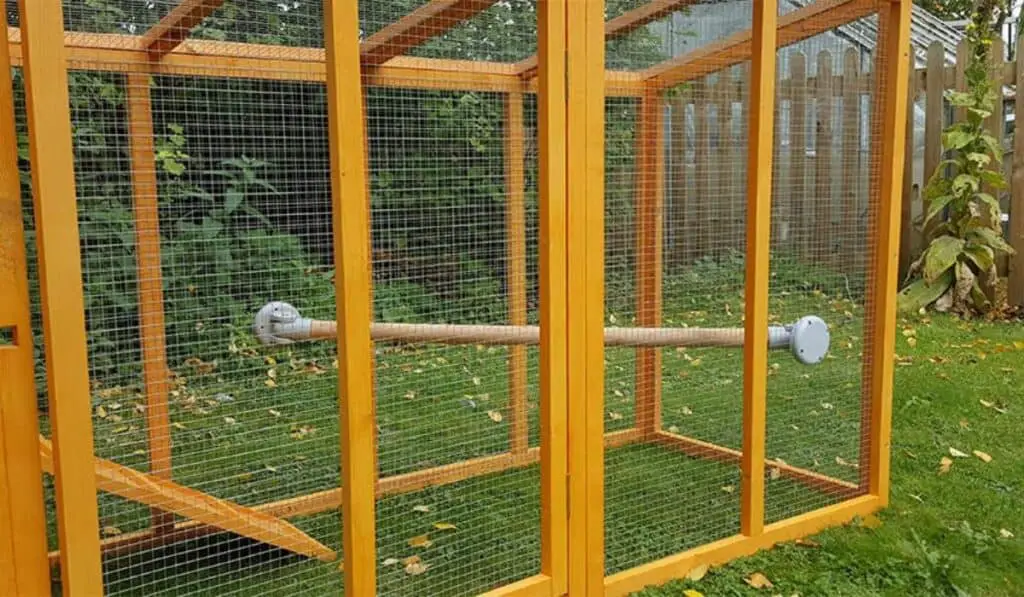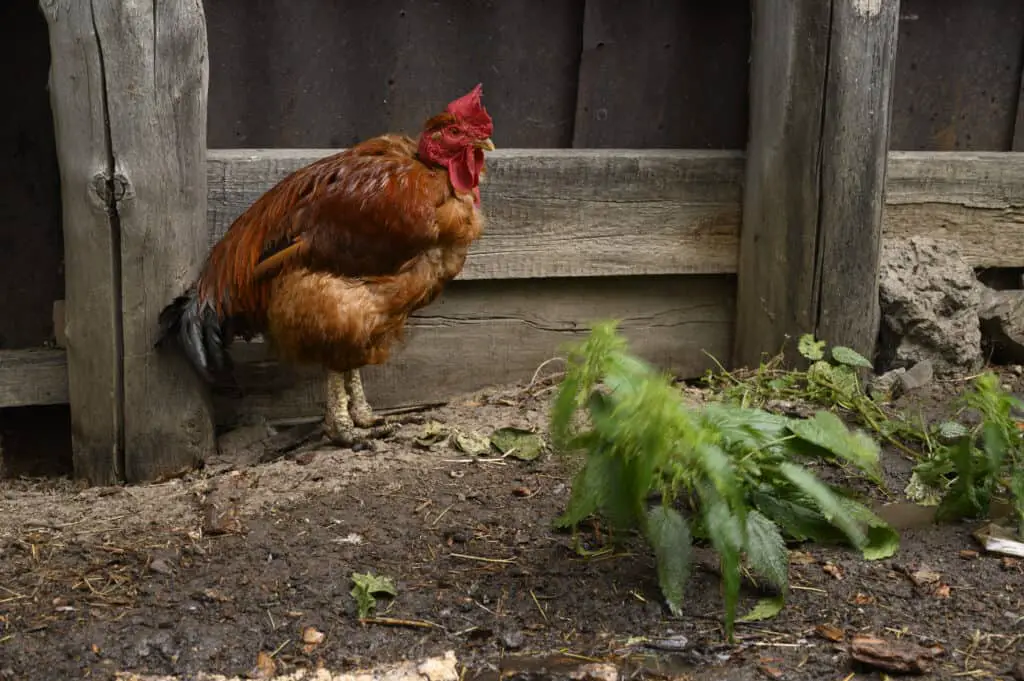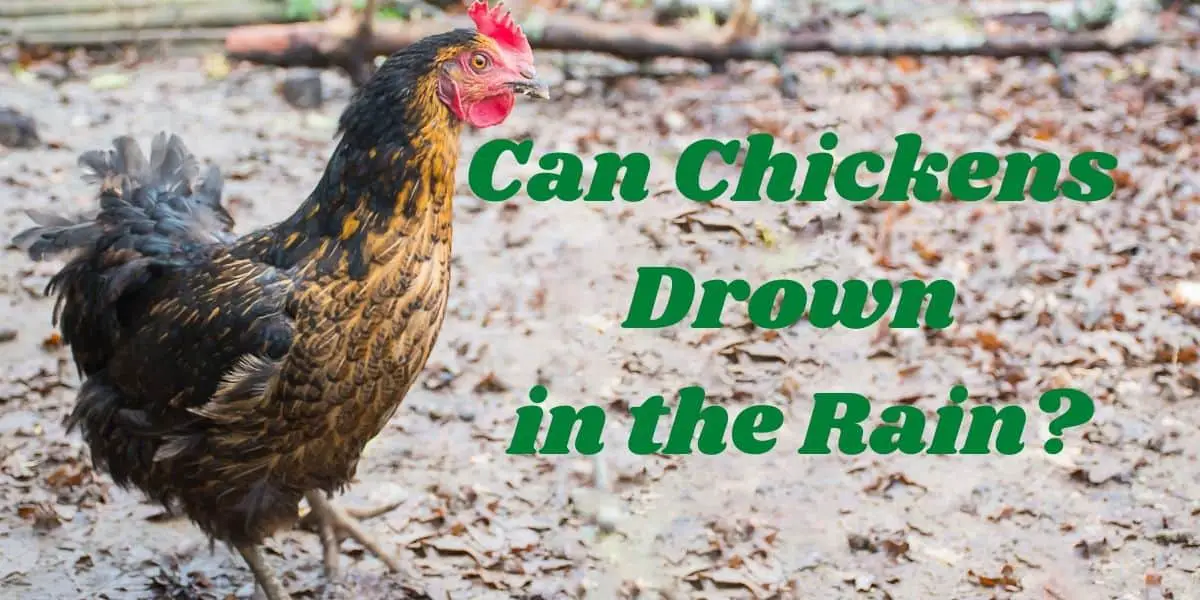If you have chickens, you may wonder if having them out in the rain is a danger.
For example, can chickens drown in the rain?
Fortunately, chickens will not drown simply from standing out in the rain.
They will not even drown in a downpour.
The biggest risk that rain poses to chickens is that it may cause them to catch a chill or hypothermia. You can prevent this by ensuring that they have somewhere warm and sheltered to dry off. Along with this, only allow your chickens out in a medium to light rainfall, and always herd them into their coop in a downpour.
They may not drown, but they will almost certainly catch a chill.
If your chickens become cold, hypothermia becomes a serious risk.
In the right conditions, chickens may enjoy the rain and will use it as a chance to catch a buggy snack!
Looking for a new Chicken Coop? Check out our Favorite ones from Omlet here ↗️
Table of Contents
Can Rain Kill Chickens?
Chickens will not generally suffer ill effects from rain, assuming there is nearby shelter.
They will need somewhere to dry off.
Chickens can be outside during light to medium rainfall, but should always be herded into their coop during a downpour.
This is because their feathers are only slightly water-proof.
If the rain is heavy enough, it can penetrate their feathers to the skin, causing them to catch a deadly chill.
This can also happen even in light or medium rainfall when your chickens are without somewhere to quickly -and fully- dry off.
Chickens that are wet for too long can quickly develop hypothermia, which can kill.
Your chickens may wander out in the rain, and will not drown, but you will need to make sure that there is always an available shelter.

Chickens Usually Enjoy the Rain
Can chickens drown in the rain?
Thankfully, no -in fact, chickens tend to really enjoy the rain. This is because it brings so many bugs out, and it’s easy for an opportunistic chicken to nab a snack!
Chickens will often go out into the rain to hunt, as many kinds of birds will (have you seen a robin pluck up an unfortunate, soggy worm?).
There are few things that chickens love more than a good snack.
Normally, chickens will retreat if the rain becomes too heavy, but your more adventurous chickens may have to be herded into the coop in a downpour.
Providing your chickens with a perch off the ground will give them the option to keep their feet dry when it’s raining. It prevents them from standing in the cold rainwater all day.
Chicks Should Never Get Wet
While chickens can enjoy the rain, chicks should not be exposed to it, ever! Chickens are at least slightly water-repellent, but chicks still have only their baby feathers (known as downy feathers.
Adults have these, too, but only on their bellies).
This means that they are not even the littlest bit water-proof. When it comes to hypothermia, chicks are the most at-risk.
Silkie Chickens Shouldn’t Get Wet
Silkie chickens are similar to chicks in that their fur is far too soft and downy to repel any water.
While most (adult) chicken varieties may venture out into the rain, your silkies should be kept in their shelter. Otherwise, the rain will quickly soak them through, and they are sure to fall ill. Hypothermia is a big risk.
Make Sure Wet Chickens Get Warmed-Up and Dried-Off
If your chickens become too wet, you will need to warm them up right away and dry them off.
This goes doubly so if they show any signs of hypothermia at all.
Signs include: lethargy (low-energy/low-movement), puffed-feathers, staring blindly, and becoming stiff.
Ensure they have dry and warm bedding in their coop changed regularly to allow them to dry and warm up.
Again, for chicks, getting wet can especially fatal.
So, what can you do? Bring them somewhere warm and dry, and wrap them in a heated towel.
Place them in your arms, on a -covered- couch, etc., so they don’t lose heat into the floor.

Can Chickens Sleep in the Rain?
Did you know that chickens can be very deep sleepers?
For this reason, they will typically make sure that they are somewhere quite safe and sheltered before they doze off.
Otherwise, chickens are capable of sleeping right through rain, ending up terribly wet, and often catching a chill.
Can Chickens Swim?
You might also wonder, can chickens swim?
They sort-of can. Technically, chickens are lightweight and able to stay afloat.
This is assuming that they don’t panic and accidentally drown themselves, however.
Also, when a chicken is in water for too long -especially cold water- they will quickly catch a chill.
Hypothermia is a serious risk.
Chickens should not be allowed to swim unless they are supervised in a warm, extremely shallow kiddie-pool.
Can Chickens Drown in Water?
Can chickens drown in the rain?
No, but they can drown in water. In fact, puddles and even their drinking water can pose a serious risk.
Why is this? Because chickens are not waterfowl.
Their feathers are only slightly water-repellent, and not water-proof.
Chicken feet are not webbed like duck feet, either. This makes it much more difficult for them to maneuver.
For chickens, water is a necessary evil.
They will swim if they must, to cross a small stream or puddle, which they can normally traverse OK.
Chickens should never be allowed near deep or running water, like a pond, stream, or river.
Additionally, you will want to monitor your chickens’ drinking trough or bowl.
Make sure that it’s not very deep, and that there’s no way that a chicken (or chick) could climb inside and get stuck.
Recommended is to place stones in the water, so chicks can swim to safety on their own (and await your rescue. They will need to warm up and dry off!).
If you have a kiddie pool for your ducks, your chickens may decide to test the water. Ideally, they should do this only when they are supervised.
Also makes sure to include a ramp so that they can climb out on their own, as this may prove a lifesaver.
Final Thoughts
If you were wondering, ‘can chickens drown in the rain?’ then hopefully this dispelled some of your worries! Chickens will not drown in the rain.
They even like to go out in the rain, to seek out bugs for a snack.
Your chickens will absolutely need a warm shelter in which to dry off afterward, however.
Chickens should not become excessively wet or remain wet, or hypothermia will become a serious risk.




